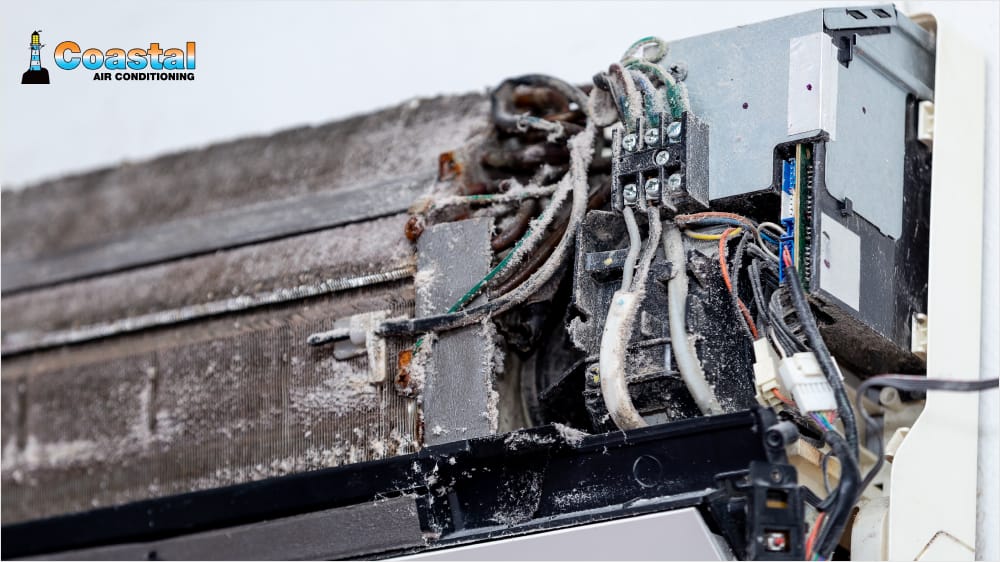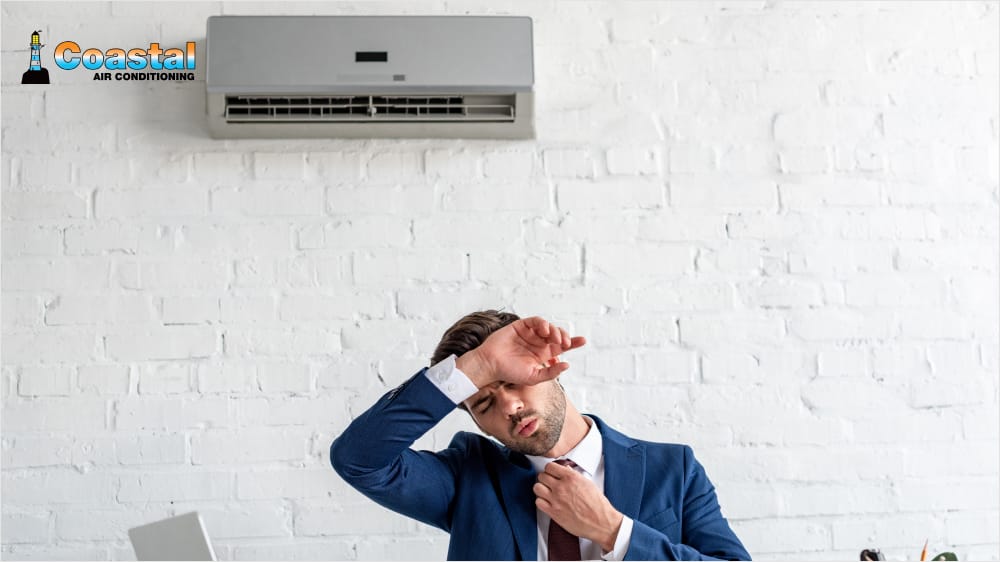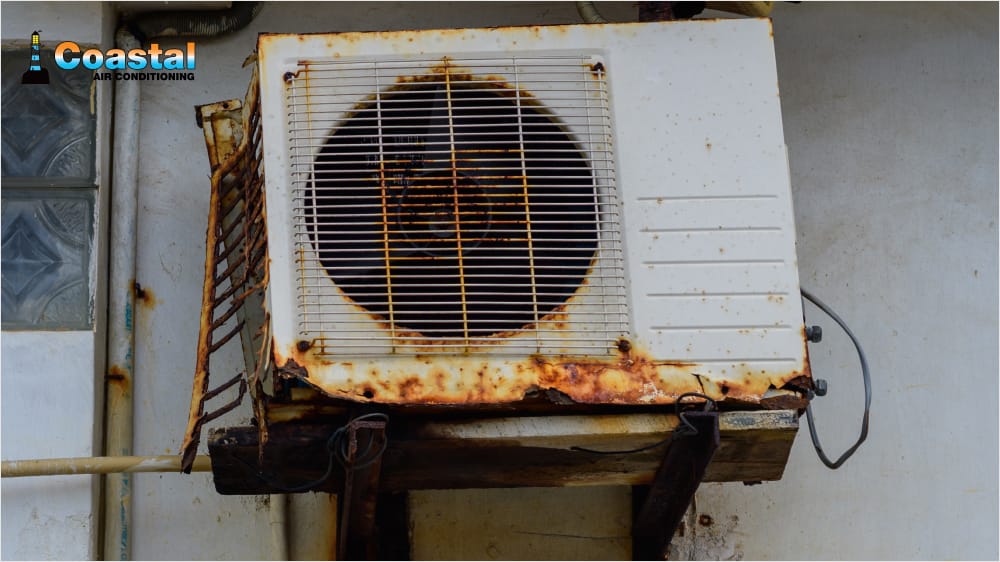It’s the hottest day of summer. The weather forecast warns of record-breaking temperatures, and suddenly, your air conditioner stops working. We’ve all had that moment of panic when essential home systems fail at the worst possible time.
The good news? Your air conditioner rarely fails without warning. By recognizing the early signs of AC trouble, you can address issues before they lead to complete system failure—saving you from discomfort, inconvenience, and often significant expense.
This guide will walk you through the 10 most common warning signs that your air conditioner is heading for trouble, and more importantly, what you should do when you notice them.
1. Unusual Noises Coming From Your AC Unit
Your air conditioner should operate with a gentle hum. When it starts making strange noises, it’s communicating that something isn’t right. Different sounds indicate different problems:
- Grinding or scraping: Metal components may be rubbing together. This could indicate motor bearing issues or damaged fan blades.
- Banging or clanking: Loose or broken parts may be hitting other components. Often points to a problem with the blower assembly or motor.
- Hissing: Likely a refrigerant leak, which reduces cooling efficiency and can damage the compressor.
- Clicking (beyond normal startup/shutdown): Potential electrical problems or failing control components.
What to do next: Turn off your air conditioner immediately if you hear loud, unusual noises. Minor noise changes might be resolved by tightening external panels or removing debris, but persistent or loud noises warrant professional inspection before more expensive components are damaged.

2. Weak or Inconsistent Airflow
When the air coming from your vents feels weak, or some rooms receive good airflow while others don’t, your AC is struggling. This symptom often appears before complete failure and indicates several possible issues:
The most common causes include clogged air filters, blocked vents, duct leaks, or a failing blower motor. Left unaddressed, weak airflow forces your system to run longer, increasing wear on all components and accelerating system failure.
What to do next: Start by checking and changing your HVAC filter if it’s dirty. Make sure all vents are open and unobstructed. If these simple fixes don’t improve airflow, your system likely needs professional attention to examine ductwork, the blower motor, or internal blockages.

3. Your AC Blows Warm Air
Perhaps the most obvious sign that something is wrong: your air conditioner runs but doesn’t cool. When warm air flows from your vents while the AC is running, several critical issues might be at play:
Low refrigerant levels due to leaks, compressor failure, or a frozen evaporator coil are the most common culprits. Sometimes the problem is as simple as incorrect thermostat settings, but often warm air indicates serious system issues requiring immediate attention.
What to do next: First, verify your thermostat is set correctly to “cool” and the temperature setting is appropriate. Check that the outdoor unit is running. If these basics check out, professional service is needed, as refrigerant issues and compressor problems require specialized tools and expertise.
4. Frequent Cycling On and Off
Air conditioners normally cycle on and off to maintain your desired temperature. However, if your system runs for only brief periods before shutting down, or cycles excessively throughout the day, it’s heading for trouble.
Short cycling places tremendous strain on compressor components, often leading to premature system failure. It can be caused by an oversized unit, electrical problems, thermostat malfunctions, or low refrigerant levels.
What to do next: Check for a clogged air filter, which can cause overheating and cycling. Make sure your outdoor unit is clear of debris. If the problem persists, a professional should inspect your system’s electrical components, refrigerant levels, and overall sizing for your home.

5. Rising Energy Bills Without Increased Usage
When your electricity bills climb significantly without corresponding changes in usage patterns, your air conditioner is likely losing efficiency as it approaches failure.
An efficient AC unit maintains consistent operation costs. When internal components wear out or refrigerant levels drop, the system works harder to deliver the same cooling, consuming more electricity. Bills that increase 15-20% or more year-over-year (beyond rate increases) often indicate impending system problems.
What to do next: Compare your energy consumption (not just costs) to previous years during similar weather conditions. Schedule professional maintenance if you notice significant increases. A technician can identify efficiency losses and recommend repairs or optimization to restore performance.
6. Water Leaking Around Your Indoor Unit
Some condensation is normal for air conditioners, but visible water pooling around your indoor unit signals trouble. Proper AC operation should direct condensation outside through the condensate drain line.
Common causes include clogged drain lines, rusted or cracked drain pans, or excessive condensation from low refrigerant levels. Besides indicating AC problems, leaks can damage flooring, drywall, and promote mold growth in your home.
What to do next: For minor leaking, you can try clearing the condensate drain line with a wet/dry vacuum or carefully flushing it with distilled vinegar. However, if leaking continues or is substantial, professional service is needed to prevent water damage and address the underlying cause.
7. Unusual Smells When AC Runs
Different odors from your air conditioning system indicate specific problems that often precede failure:
- Musty or moldy smells suggest moisture buildup and microbial growth in your system or ductwork
- Burning odors often indicate electrical problems, worn insulation, or overheating components
- Sweet, chemical smells might point to refrigerant leaks, which require immediate attention
Beyond signaling AC issues, these odors can impact indoor air quality and potentially affect your family’s health.
What to do next: If you detect burning smells, shut down your system immediately and call for service, as electrical issues pose fire hazards. For musty odors, scheduling a professional duct cleaning and evaporator coil inspection can address microbial growth. Chemical smells warrant a complete system inspection for refrigerant leaks.

8. Your AC Unit is More Than 10-15 Years Old
Age alone is a reliable predictor of upcoming air conditioner failure. Most residential systems are designed to last 10-15 years with proper maintenance, though some quality units may function longer.
As systems age, they become progressively less efficient, more prone to breakdowns, and increasingly expensive to repair. Components wear out, refrigerant leaks become more common, and parts availability decreases for older models.
What to do next: If your AC unit exceeds 10 years of service, begin researching replacement options before failure occurs. For units between 10-15 years, weigh the cost of significant repairs against replacement. Modern systems offer substantial efficiency improvements that often make replacement more economical than repairing older units.
9. Your Home Has Uneven Cooling
When some rooms feel perfectly comfortable while others remain warm, your air conditioner is struggling to distribute cooled air properly throughout your home.
Uneven cooling often results from ductwork issues, improper system sizing, zoning system failures, or refrigerant problems. As your system approaches failure, it may no longer generate enough cooling capacity to reach areas farther from the air handler.
What to do next: Close blinds and curtains in sun-exposed rooms during peak heat. Ensure furniture isn’t blocking vents. If simple adjustments don’t help, professional duct inspection and system evaluation are necessary to determine if repairs can resolve the issue or if replacement is more appropriate.
10. Ice Formation on the AC Unit
Ice has no place on your air conditioner, whether on the outdoor unit or indoor evaporator coil. Its presence always indicates a significant problem requiring immediate attention.
Ice typically forms due to restricted airflow (from dirty filters or blocked returns), low refrigerant levels, or mechanical failures. Continuing to run an icing system can cause compressor damage—the most expensive component to replace.
What to do next: Turn off your air conditioner immediately. Once the ice melts, you can try replacing the air filter and restarting the system. If ice reforms, shut it down and call for professional service, as refrigerant issues require EPA-certified technicians to resolve.
Preventing Future Failures
The most effective way to avoid air conditioner failures is through consistent preventative maintenance. Consider these best practices:
- Change air filters every 1-3 months
- Keep outdoor units clear of debris and vegetation
- Schedule professional maintenance in spring before cooling season
- Consider a maintenance agreement for priority service and regular inspections
- Address minor issues promptly before they cause major system damage
By recognizing these warning signs and taking prompt action, you can often prevent complete system failure, extend the life of your current air conditioner, and make planned transitions to new systems when necessary—avoiding the discomfort and urgency of emergency replacements.
Don’t wait until your air conditioner completely fails on the hottest day of summer. If you’ve noticed any of these warning signs, contact our experienced technicians at Coastal Air Conditioning today for a comprehensive system evaluation and honest recommendations for your specific situation.




